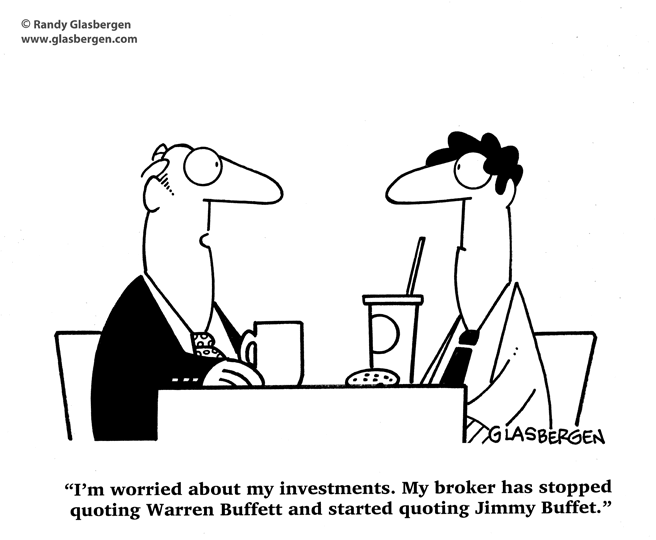

The Value of a Good Broker
Real estate agents and insurance brokers are often maligned. It offends some people that an individual can collect a big fat commission cheque for what looks like a few hours of work. Having worked with insurance brokers more closely since co-founding ASI almost 20 years ago and having worked with a real estate agent fairly closely over the past year, I hold a different view. I will save the real estate story for another time – suffice to say there was lots of value in the relationship.
Large consulting firms all own their own insurance brokerages and the firm compensation is often a mix of fee-for-service and commissions. When we started ASI we made a conscious decision not to get an insurance license for two reasons: First, as a two-person organization we thought becoming experts in insurance would spread our expertise too thin. Second, we liked the transparency that came from sending invoices for our fees that would be approved and paid by the client.
The other benefit that we gained from our decision was that we have been able to partner with several brokers and professionals that offer advice on insurance and investments which are services that we do not provide while at the same time those advisors look to rely on us for actuarial services that they do not provide – the proverbial ‘win-win’.
Why we like brokers
In a recent pension plan wind-up, our client was proposing to go directly to the insurance market for annuities without the use of a broker. While we recommended the client consider the broker they were already using for investment advice, the client felt there wasn’t enough value in adding an intermediary. While I am happy to recommend ideas to clients, it is always the client’s call and so if they want to go direct we will support that as long as no one is confused into thinking that ASI is a broker – we are not.
Quickly into the annuity purchase we got word from a number of insurers that they would not be quoting. No clear excuse – a mix of busyness, capacity, and prioritization of opportunities. We fed this information back to the client and again asked if they might be better served by working with a broker. This time they agreed. The end of the story is that the broker ‘enticed’ more insurers to quote that we couldn’t attract and the annuities ultimately settled for a savings of more than $100,000 net of the broker commission – once again, the proverbial ‘win-win’. In addition to access to markets, brokers often have insight into market pricing that helps them negotiate deals. Clients going direct to insurers will rarely have this pricing information.
Cost vs Value
Many of us were trained to measure costs in dollars. Something that costs more dollars is more ‘expensive’. But as our sophistication increases we come to see cost not just as dollars but as opportunity cost. In my story above the broker ‘cost’ more than the client would have paid letting us handle the work but we would have ‘cost’ the client more in terms of total cost of doing business.
Is it fair that the broker might have only worked 10 or 20 hours to make $30,000? When I was being trained we were taught to despise these arrangements as patently unfair – gouging really. But there are two things I have learned over the years. First, a broker will often help a client solve a problem and at that particular moment there will be no sale of a product and no resulting ‘commission’ to be earned. The broker’s time is an investment in the relationship and the long-term income the client can provide. Second, not all clients are ‘profitable’ under a commission structure. In the fee-for-service world we try to get each client to pay their share of our time and overhead. In the commission world you help as many clients as you can and sometimes the help far outweighs the commission and sometimes it is the opposite. Commissions align payment with those that can afford it and delivers services to those that need them.
Fee Disclosure
So since this sounds so nice, why do people still have a problem with paying for services on a commission basis? In my mind one of the biggest problems is the inability to measure value which in large part is due to the lack of clear line of sight on the commissions being paid.
For years the best brokers that we work with have been telling their clients the commissions they are receiving. This goes a long way towards letting the client measure the value of the services they are receiving. Unfortunately commission disclosure is not uniform across the insurance or investment industries and so it is often hard to compare apples-to-apples.
Starting with 2016, investment advisors regulated by our Canadian security regulators are going to have to disclose their commissions to their clients. As December 31, 2016 statements have started to roll out we are seeing the inconsistent disclosure practices from one organization to the next, so the value of this disclosure is going to take some time to be realized. But it is certainly a step in the right direction.
Looking ahead
Many investment advisors have struggled to provide a robust service to entry level investors with small accounts. Those advisors that did, delivered more value than the compensation they received, sometimes in the hope the account would grow over time and sometimes through subsidies provided by their larger accounts.
Fee disclosure is going to sensitize all consumers to the fees that they are paying and the value that they are receiving. While arguably a good thing, this increased transparency is going to cause advisors and their clients to revaluate their relationships – and either recalibrate the fee-service balance or end their relationships. We are already seeing the rise of ‘robo-advisors’ which offer low cost funds with little if any personal advice. While I personally don’t think this model will serve the entry level investor well, it is certainly a solution to those that feel they cannot afford better advice. But as I pointed out earlier in this commentary – sometimes focusing only on cost misses the opportunity to get the best value.



Comments
4